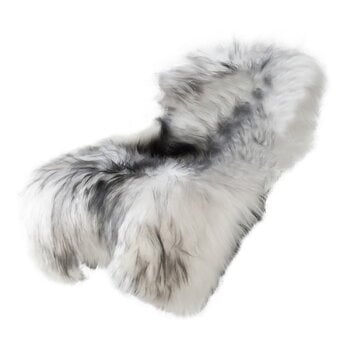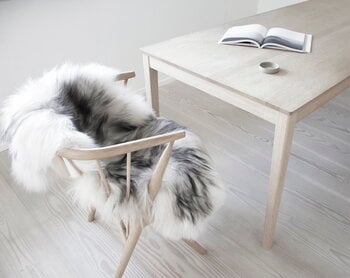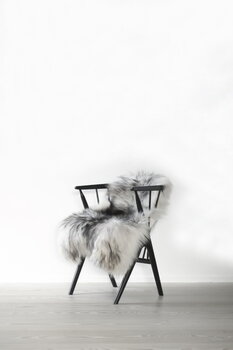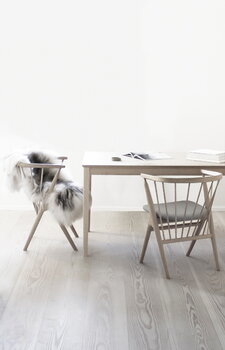The Icelandic sheepskin by Sibast brings your home delicate warmth and quality of the Icelandic sheep’s wool. As a result of the cold and harsh climate of Iceland, native Icelandic sheep have developed a special wool consisting of two types of fibres: the outer fibres are long and water-repellent, while the shorter inner fibres are particularly soft, fine and insulating. Coloured in lighter and darker shades of natural wool, the Icelandic sheepskin can be used for example on the floor, bed or armchair, and it goes perfectly together with the wooden lounge chairs by Sibast.
Icelandic sheepskin, white - black
Sibast
Description
The Icelandic sheepskin by Sibast brings your home delicate warmth and quality of the Icelandic sheep’s wool. As a result of the cold and harsh climate of Iceland, native Icelandic sheep have developed a special wool consisting of two types of fibres: the outer fibres are long and water-repellent, while the shorter inner fibres are particularly soft, fine and insulating. Coloured in lighter and darker shades of natural wool, the Icelandic sheepskin can be used for example on the floor, bed or armchair, and it goes perfectly together with the wooden lounge chairs by Sibast.
Product details (5)
- Material
- Icelandic sheepskin
- Colour
- White, black
- Length
- 110–130 cm
- Width
- 61–80 cm
- Notes
- Please note that every sheepskin is unique, and the colours may therefore vary slightly from the photos. Wool length: 12-18 cm.
- Product ID
Reviews (0)
Sustainability
The Product Sustainability Framework, our criteria of sustainable design, helps you find the most sustainable products in our selection. Read below which sustainability criteria this product has met.
Working conditions & labour 6/9
-
Equal opportunities for all employees
-
Commitment to UN Global Compact, fair compensation for all employees
-
Corporate responsibility requirements defined and communicated for suppliers
-
Systematic work for improved inclusion and well-being in the workplace
-
Transparent supply chain
-
Compliance to the UN Guiding Principles on Business and Human Rights ensured in the supply chain
-
Suppliers' compliance to a code of conduct ensured
-
Direct suppliers audited and certified
-
Support for community involvement in the supply chain
Eco-friendly production 8/9
-
Fair and resource-wise water-use in production
-
No incineration or landfilling of returned items
-
No use of endangered species as materials
-
No direct environmental emissions or waste (excl. GHGs) from production
-
The sustainability of direct suppliers' production is addressed and monitored
-
Material-efficient and ecological packaging
-
Positive impact on nature’s well-being through operations that regenerate natural ecosystems
-
No potentially harmful chemicals used in own production
-
Production and material sourcing that respect biodiversity, animal rights, and natural ecosystems
Climate impact 4/8
-
Company's direct greenhouse gas emissions identified and commitment to reduction
-
Product's carbon impact identified and commitment to reduction
-
Guidance on energy- and eco-efficient use of the product
-
Carbon neutral or carbon negative product
-
Contribution to climate initiatives beyond the brand’s direct operations
-
Low-carbon or compensated transportation
-
Carbon footprint of the product calculated and goals set to reduce it
-
100 % renewable energy in own production and operations
Sustainable materials 6/6
-
Sustainable and long-lasting material choices
-
No harmful or hazardous substances
-
Responsible raw material sourcing and production
-
Materials suited for circularity: monomaterials, recyclable finishings, renewable or recycled contents etc.
-
Ecological materials: natural, biodegradable, recyclable or recycled contents
-
Outstanding materials in terms of innovativeness, responsibility, sustainability and circularity: local production or sourcing, 100 % recycled content, C2C-certification etc.
Circular design 4/5
-
High aesthetic quality promoting long-term use of the product
-
Technically durable product design and material choices
-
Design for enduring life-long quality
-
Design and support for product maintenance, repair and upgradability
-
Innovative circular design solutions: circular service system, resale platform, remanufacturing, collection of used products, etc.











